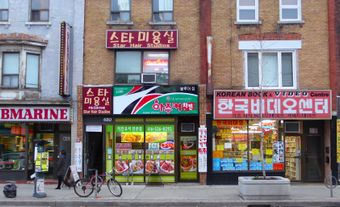Kim’s Convenience (2016–21) is a CBC TV sitcom about a Korean Canadian family that runs a convenience store in Toronto. Based on a 2011 play by Ins Choi, it was the first Canadian comedy series to star a primarily Asian Canadian cast. The acclaimed comedy explores the generational tension between immigrant parents and their Canadian-born children and was inspired by Choi’s experience growing up in a Korean family in Toronto. The show was an instant hit when it premiered on CBC in fall 2016; its first season averaged 933,000 viewers per episode. The series won eight Canadian Screen Awards, including Best Comedy Series in 2018. It also gained an international audience that year when it was made available on Netflix.

The convenience store used for exterior shots, on Queen St. East in Toronto. (courtesy booledozer/flickr)
Synopsis
Mr. and Mrs. Kim, or “Appa” and “Umma” (Paul Sun-Hyung Lee and Jean Yoon), own and operate a convenience store called Kim’s Convenience. They opened the store after they immigrated to Toronto from South Korea, where Mr. Kim was a teacher. Cantankerous and opinionated, Mr. Kim has a difficult relationship with his estranged son, Jung (Simu Liu), who ran away from home as a teenager and now works at a car rental shop with his friend and roommate, Kimchee (Andrew Phung), and his manager, Shannon (Nicole Power).
Mrs. Kim, who is very involved in her church, has kept in touch with Jung, though Mr. Kim does not know this. Jung’s younger sister, Janet (Andrea Bang), is a student at the Ontario College of Art and Design University. She lives at home with her parents and helps them run the store. Kim’s Convenience follows the conventions of the family sitcom; Appa has been compared to patriarch Archie Bunker from the classic 1970s American sitcom All in the Family.
Background
Playwright Ins Choi was born in South Korea and moved to Scarborough with his parents when he was a baby. A graduate of York University’s theatre school and the Soulpepper Academy — a theatrical training program based out of Toronto’s Soulpepper Theatre — he wanted to chronicle the experience of Korean natives who came to Toronto in the 1980s and opened convenience stores, and the divide between them and their Canadian-born children.
As a member of the fu-Gen Asian Canadian theatre company in the mid-2000s, Choi was asked by artistic director Nina Lee Aquino to write a short sketch for an upcoming event. He wrote a scene set in a convenience store, based on memories of a shop called Kim’s Grocer that his uncle owned when Choi was growing up. Aquino suggested he turn the scene into a full-length play. Choi spent five years working on the script for Kim’s Convenience, at one point receiving financial assistance from his Korean church, which raised $3,000 to help Choi mount a workshop.
Upon the play’s completion in 2010, Choi sent it to each of Toronto’s major theatre companies. Every company rejected it, prompting Choi to submit it to the Toronto Fringe Festival’s New Play Contest. It was chosen and became a standout hit of the 2011 Toronto Fringe Festival. This sparked the interest of several theatre companies offering to mount the production. In January 2012, Kim’s Convenience premiered at Soulpepper Theatre.
Choi starred as Jung. It is set in the Regent Park neighborhood of Toronto, where the Kim family’s store is located. It is partly based on Choi’s experience working in convenience stores in Toronto.
Theatrical Production
Kim’s Convenience was Soulpepper’s first full-length original play. It was directed by Weyni Mengesha and starred Paul Sun-Hyung Lee and Jean Yoon as Appa and Umma. The actors later reprised their roles for the CBC TV series. Choi played Jung, with Esther Jun in the role of Jung’s younger sister Janet. Clé Bennett played a variety of the store’s customers. In later versions of the play, Janet was played by Grace Lynn Kung. Ken MacKenzie designed the set, which critics praised as a realistic portrayal of a Toronto mom-and-pop store.
The play revolves around Appa, a fiercely proud Korean man who holds a deep-seated hatred for the Japanese. His wife, Umma, is more restrained. Unlike Appa, Umma is in contact with their estranged son, Jung, who as a teenager experimented with drugs and robbed his father before running away from home. Now an adult, Jung has a new baby and an unfulfilling job, which causes him to reflect on the sacrifices his parents made when they immigrated to Canada. At 30, Janet is not married, a situation that distresses her traditional parents, particularly her mother. The play also deals with gentrification, as the Kim family takes note of the changes in the neighborhood; their church has been sold to a developer, and the construction of new condominiums brings the threat of chain stores that could put the Kims’ shop out of business.
In a glowing review in the Toronto Star, theatre critic Richard Ouzounian wrote that the play is “the kind of show that restores one’s faith in the theatre.” The Globe and Mail’s J. Kelly Nestruck also reviewed the play favourably, comparing its style to that of a sitcom, “with snappy one-liners, light slapstick and intermittent doses of sentimentality.” Kim’s Convenience won two Toronto Theatre Critics awards in 2012, one for Best Canadian Play and one for Best Actor, awarded to Lee for the role of Appa.
Kim’s Convenience was the most commercially successful show in Soulpepper’s history. After its original run in early 2012 quickly sold out, the company decided to stage a remount later that year, and then again in 2013. A cross-country touring production also kicked off that year. In 2015, the play had another run at the Bluma Appel Theatre at Toronto’s St. Lawrence Centre for the Arts.
In 2017, Soulpepper brought Kim’s Convenience to New York City’s Off-Broadway venue Pershing Square Signature Center. Rosie Simon played Janet in this version, with Ronnie Rowe Jr. replacing Clé Bennett in multiple roles. A New York Times review criticized the show’s reliance on “exaggerated stereotypes,” but concluded that many viewers were likely to see themselves in the show’s story of generational strain.
CBC TV Series
Production companies began enticing Choi with offers to adapt his play for the screen as early as 2011. Choi was initially hesitant, concerned with preserving the integrity of his original vision. He had met a former TV executive named Ivan Fecan at a Soulpepper rehearsal in 2011. By 2014, Fecan was the head of his own production company, Thunderbird. Representatives from Thunderbird approached Choi while Kim’s Convenience was onstage in Vancouver, and Choi agreed to work with the company to develop his play as a TV series. He also paired with showrunner Kevin White, who had written for the sitcoms Corner Gas and Schitt’s Creek.
Paul Sun-Hyung Lee and Jean Yoon play Appa and Umma, with Simu Lee and Andrea Bang playing siblings Jung and Janet, respectively. Andrew Phung was cast as Jung’s best friend, Kimchee, and Nicole Power joined the cast as Jung’s boss and love interest, Shannon. Uni Park plays Mrs. Park, a well-to-do member of Umma’s church and her main nemesis. Michael Xavier plays Alex, a police officer and childhood friend of Janet’s. Soo-Ram Kim has a recurring role as Janet’s cousin, who occasionally visits from Korea. In Season 2, she moves to Canada. Also in the second season, Janet moves out of her parents’ home and into an apartment with roommates.
Kim’s Convenience was filmed in Toronto. The interior of the store was shot on a soundstage at Toronto’s Showline Studios. For the exterior, a CBC location manager chose a real convenience store on Queen Street East, originally called Mimi Variety. The store’s Korean owners, Yong and Kyung Chung, were hesitant to participate in the series until their daughter informed them that the show would feature a positive depiction of Korean Canadians. Set designers created a new sign for the store, which the owners decided to leave up permanently.
Premiere and Reception
In October 2016, Kim’s Convenience premiered on CBC to largely positive reviews. The Globe and Mail’s John Doyle called it a “funny, sharply written comedy with the right dollops of goofy delight.” Writing about the show’s premiere episode, in which Appa confronts a pair of customers who want to put up a poster for a gay pride event, Adrian Lee of Maclean’s noted that the premise was “downright radical.”
International Audience
In 2018, the show was made available for an international audience on Netflix. Critic Inkoo Kang called the series “a word-of-mouth phenomenon among Asian Americans since its arrival on Netflix.”
Awards
- Best Picture Editing in a Comedy Program or Series (Kye Meechan) (2017)
- Best Performance by an Actor in a Continuing Leading Comedic Role (Paul Sun-Hyung Lee) (2017)
- Best Performance by an Actor in a Featured Supporting Role or Guest Role in a Comedic Series (Andrew Phung) (2017)
- Best Supporting or Guest Actor, Comedy (Andrew Phung) (2018)
- Best Lead Actor, Comedy (Paul Sun-Hyung Lee) (2018)
- Best Comedy Series (2018)
- Best Guest Performance, Comedy (Amanda Brugel) (2020)
- Best Supporting Actor, Comedy (Andrew Phung) (2020)
Leo Awards
- Best Direction in a Music, Comedy, or Variety Program or Series (Siobhan Devine) (2018)
- Best Performance or Host in a Music, Comedy or Variety Program or Series (Andrea Bang) (2018)
- Best Music, Comedy, or Variety Program or Series (2018)
- Best Direction in a Musical, Comedy, or Variety Program or Series (Siobhan Devine) (2019)
- Best Performance or Host in a Music, Comedy or Variety Program or Series (Andrea Bang) (2020)
- Best Direction in a Musical, Comedy, or Variety Program or Series (Siobhan Devine) (2020)
- Best Music, Comedy, or Variety Program or Series (2020)
Others
- Outstanding Performance – Female (Jean Yoon), ACTRA Awards (2017)
- Best Direction, Television Program or Series (Aleysa Young), Canadian Comedy Awards (2018)
- Best Performance by an Alberta Actor (Andrew Phung), Alberta Media Production Industries Association (AMPIA) Awards (2018)

 Share on Facebook
Share on Facebook Share on X
Share on X Share by Email
Share by Email Share on Google Classroom
Share on Google Classroom


